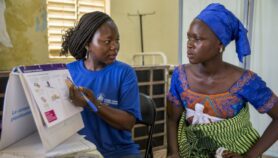By: Esther Nakkazi
Send to a friend
The details you provide on this page will not be used to send unsolicited email, and will not be sold to a 3rd party. See privacy policy.
[KAMPALA] A large-scale trial to compare the effectiveness of oral tablets and vaginal gels for HIV prevention among young, unmarried African women has yielded disappointing results, a study reports.
Most trial participants failed to follow guidelines for using the products — Truvada gel and Tenofovir tablets that must be applied or taken daily — which led researchers to conclude that, despite being safe, the products are not effective for this group.
"No intervention is going to be effective unless it’s used," says Zvavahera Chirenje, one of the study’s lead authors and a researcher at the University of Zimbabwe in Harare. "The majority of participating women did not use any of the study products as recommended."
SPEED READ
- Two-thirds of trial participants failed to follow guidelines
- Researchers suspect hectic lifestyles and poor awareness of at-risk status curtail product use
- This ‘very high risk’ group urgently needs ‘safe, effective and practical HIV prevention methods’
Previous studies on some microbicide gels have also shown little effectiveness.
The three-year study, the Vaginal and Oral Interventions to Control the Epidemic (VOICE), was a major HIV prevention trial to test whether Truvada and Tenofovir are effective in preventing sexual transmission of HIV in women.
It was carried out in South Africa, Uganda and Zimbabwe, and involved more than 5,000 participants — about a half of them under 25 years old and 80 per cent unmarried.
"We do not know why most of these young women at high risk [of infection] did not use the trial products to prevent HIV," says Clemensia Nakabiito, principal investigator for the Makerere University-Johns Hopkins University Research Collaboration (MUJHU), which focuses on HIV prevention.
"We suspect that the youngsters’ hectic lifestyles, lack of time, and disregarding of the fact that they are high risk can be blamed for the low adherence," she adds.
Teopista Nakyanzi, MUJHU community coordinator, tells SciDev.Net that older, married women who have extra-marital sex are more inclined to consider themselves high risk and to protect themselves than younger women. Women account for 60 per cent of adults living with HIV in Sub-Saharan Africa.
Laboratory tests detected drugs in less than a third of blood samples from women who were assigned to use either tablets or gel, and in less than a quarter of samples from women designated to use gel.
"These were very low rates, [preventing us] determining whether products were effective in those who used [methods] consistently," says Chirenje.
Researchers suggest that HIV prevention products that require minimal adherence may be more suitable for young unmarried women. Conversely, they say daily prevention programmes are more suitable for couples with one HIV positive partner and homosexual men.
Two ongoing trials — ASPIRE and the Ring Study — are evaluating a vaginal ring that releases an antiretroviral drug over a month period.
Due to low adherence rates, "we need to emphasise combination prevention", says Jeanne Marrazzo, professor of medicine at the University of Washington in Seattle, United States.
"This group of young women remains at very high risk of HIV infection, and urgently needs safe, effective and practical HIV prevention methods that they will actually use," she adds.
Link to study results announcement
This article has been produced by SciDev.Net’s Sub-Saharan Africa desk.













